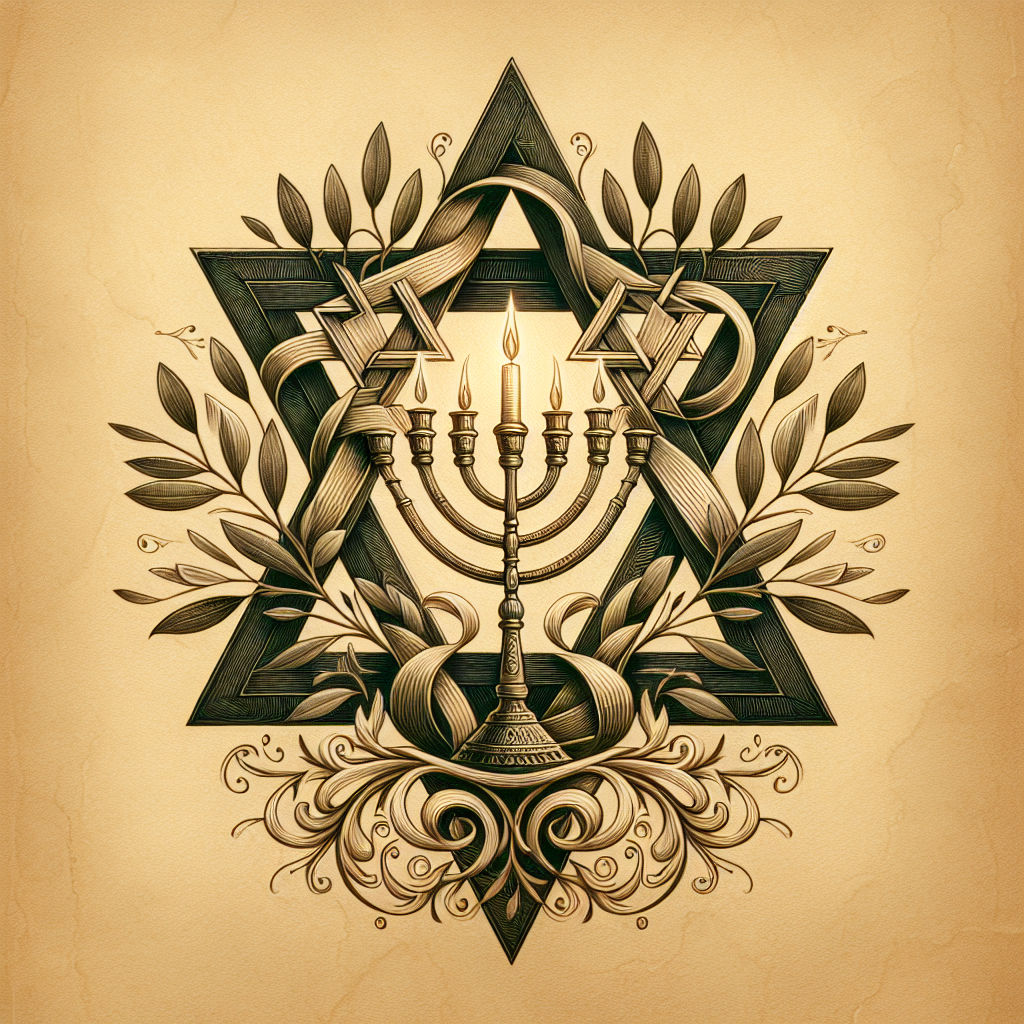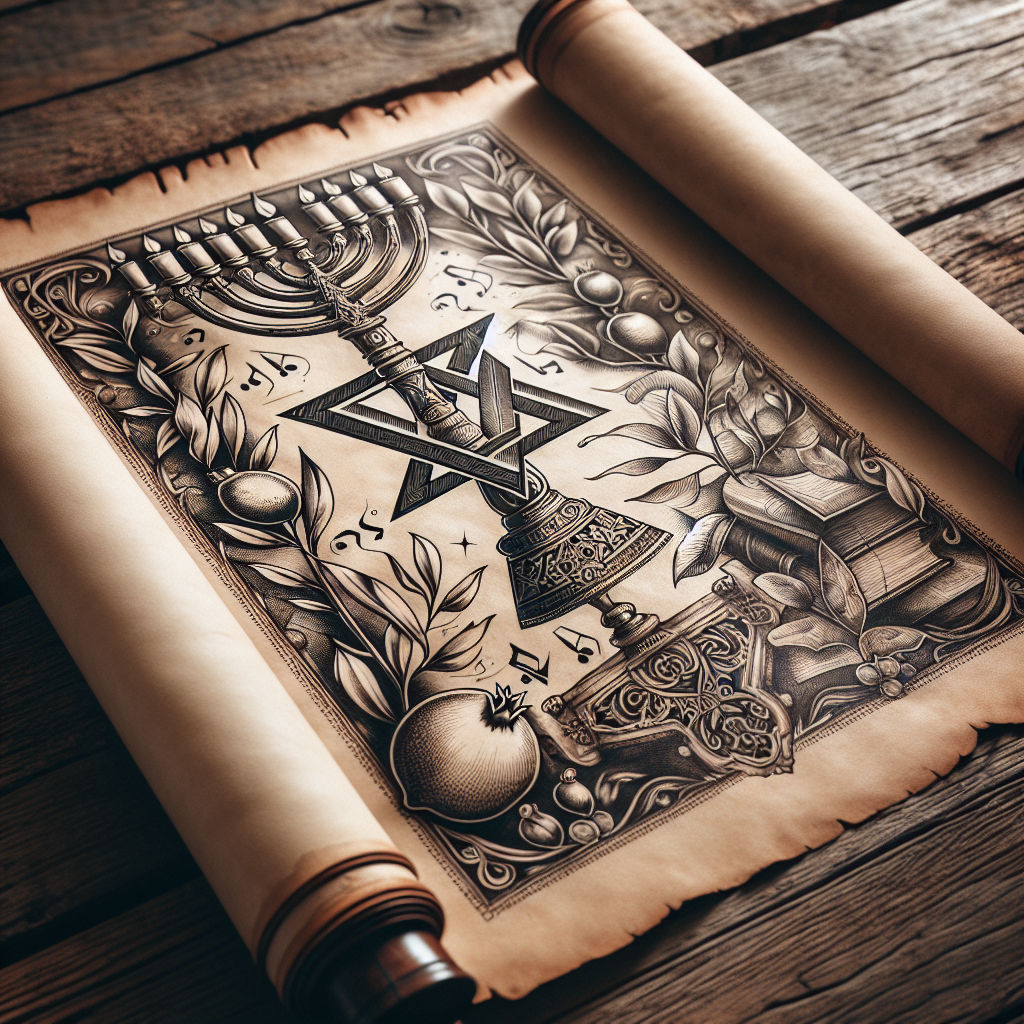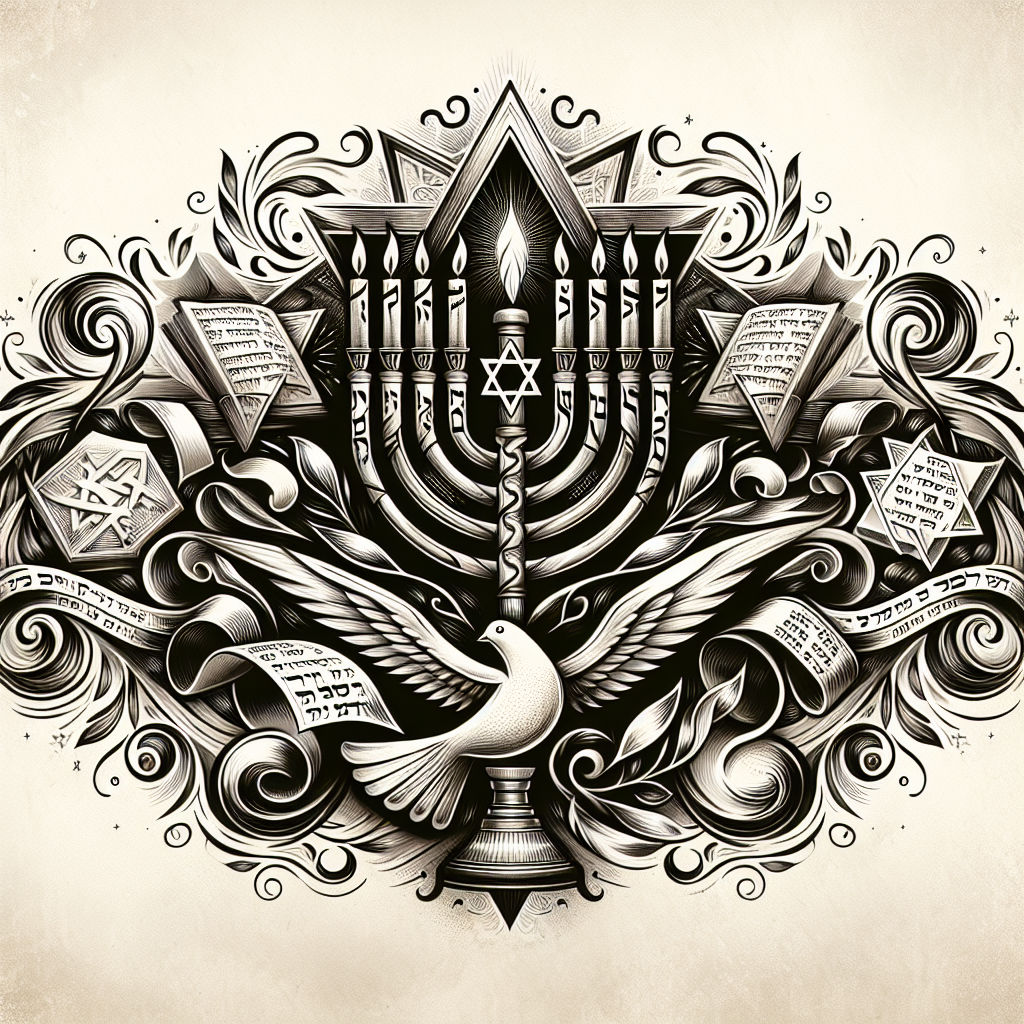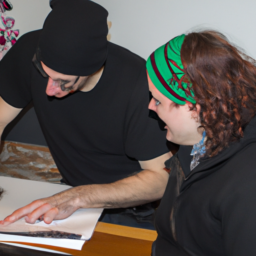“Cultural Significance of Jewish Tattoos: What You Need to Know”
Introduction to Jewish Tattoos
The intricate tapestry of Jewish culture is woven with a myriad of traditions, beliefs, and practices. Among these, the topic of tattoos often surfaces with a shroud of misconception. It’s a common belief that tattoos are strictly forbidden in Judaism, yet this is not entirely accurate. In recent times, we have witnessed a modern embrace of tattoos among Jewish individuals, a phenomenon that challenges traditional norms and invites a deeper understanding of their cultural significance.
The aim of this article is to persuade readers to look beyond the surface and appreciate the profound cultural relevance of Jewish tattoos. It’s an invitation to explore how ink on skin can become a canvas for Jewish identity, history, and expression. As we delve into this subject, we will uncover the layers of meaning that tattoos hold for many Jews today, and how these marks are much more than mere body modifications.
Historical Context of Tattoos in Jewish Culture
To fully grasp the contemporary perspective on Jewish tattoos, one must first understand their historical context. The Bible, specifically Leviticus 19:28, states, “You shall not make any cuts in your body for the dead nor make any tattoo marks on yourselves: I am the Lord.” This verse has been the cornerstone of the traditional Jewish stance against tattoos. However, interpretations of this commandment vary, and the original Hebrew text’s translation to “tattoo” is not unanimously agreed upon.
The impact of the Holocaust has also profoundly influenced Jewish perceptions of tattoos. The Nazis’ brutal practice of forcibly tattooing prisoners with identification numbers has left an indelible mark on the collective Jewish memory. For many, these tattoos became symbols of the dehumanization and suffering endured by Jews during this dark chapter of history.
Yet, despite this painful association, tattoos have found a place in the narrative of Jewish resilience and identity. The very act of choosing to get a tattoo can be seen as a reclaiming of control over one’s body, a stark contrast to the forced markings of the Holocaust. This shift in perception is a testament to the evolving nature of Jewish thought and the community’s ability to find new meaning in old traditions.
Tattoos as a Form of Identity and Expression
For many Jews today, tattoos serve as a personal symbol of their identity. These body markings can represent a myriad of things: a connection to their heritage, a declaration of faith, or a reminder of the values they hold dear. Hebrew script, for instance, is a popular choice for tattoos, with phrases from the Torah, names, or words like “chai” (life) and “ahava” (love) etched onto the skin as a permanent testament to their beliefs and culture.
Jewish symbols, too, find their way into the designs of tattoos. The Star of David, the menorah, and the Tree of Life are just a few examples of motifs that carry deep historical and religious significance. By incorporating these symbols into tattoos, individuals can carry a piece of their Jewish identity with them at all times, creating a tangible connection to their ancestry and faith.
The act of getting a tattoo can also be a form of storytelling, a way to keep the narratives of the past alive. For some, it’s about honoring the memory of loved ones or commemorating significant life events. For others, it’s a means of expressing their personal journey within the Jewish faith, whether it’s one of adherence to tradition or a path of progressive interpretation.
In the landscape of Jewish tattoos, we see a vibrant expression of individuality and a celebration of heritage. These tattoos are not mere adornments; they are declarations of identity, personal milestones, and a canvas for the stories that shape the lives of those who bear them.
As we navigate the complexities of Jewish tattoos, it’s essential to approach the subject with an open mind. The ink that marks the skin of Jewish individuals is more than a trend; it’s a reflection of a rich cultural tapestry that continues to evolve. By embracing the diversity of Jewish practice and expression, we can appreciate the profound ways in which tattoos have become a meaningful part of the Jewish experience for many.

Commemoration and Remembrance Through Ink
In the tapestry of Jewish life, where memory and history are interwoven into the very fabric of existence, tattoos have emerged as a poignant medium for commemoration and remembrance. Far from being mere adornments, these marks on the skin serve as a testament to the enduring legacy of those who came before us, particularly Holocaust survivors. The indelible ink is not just a personal choice but a profound statement of connection to one’s ancestry and the collective memory of a people who have faced unimaginable adversity.
The trend of descendants of Holocaust survivors choosing to get tattoos similar to their ancestors’ numbers is a powerful act of solidarity and remembrance. It is a way to keep the stories of survival etched not only in their minds but also on their bodies. This practice has sparked debate, with some viewing it as a sacred duty to bear witness, while others question the appropriateness of replicating a symbol of dehumanization. However, for many, these tattoos are a declaration that the memories of those who suffered will not fade away with time; they are a promise that the past will be remembered and lessons learned will not be forgotten.
Challenging Religious Norms with Body Art
The Jewish relationship with tattoos is evolving, particularly within progressive movements that seek to reinterpret traditional norms. Tattoos are increasingly seen as a form of personal expression that can coexist with a vibrant Jewish faith. This shift is part of a broader trend of questioning and redefining what it means to live a Jewish life in the modern world.
The role of tattoos in these progressive circles is multifaceted. They can serve as a visible sign of one’s commitment to Jewish values, a form of spiritual expression, or a way to engage with Jewish culture on one’s own terms. As interpretations of Jewish law evolve, so too does the acceptance of tattoos. The conversation is no longer about whether tattoos are allowed, but rather about how they can enhance one’s Jewish identity and experience.
Artistic and Creative Expression in Jewish Tattoos
The fusion of Jewish themes with contemporary tattoo art is a burgeoning field that allows for a unique exploration of identity and heritage. Jewish tattoo artists are at the forefront of this movement, creating designs that are deeply personal and rich with cultural significance. From the intricate Hebrew script to symbols like the Star of David or the menorah, these tattoos are a canvas for storytelling and a celebration of Jewish life.
Profiles of Jewish tattoo artists reveal a dedication to their craft and a respect for the traditions they are reimagining. Their contributions to the field are not just about aesthetics; they are about creating a dialogue between ancient symbols and modern artistry. These artists often serve as guides for those looking to express their Jewish identity through tattoos, ensuring that each piece is thoughtful and meaningful.
In conclusion, the Jewish tattoo is a symbol of resilience, a form of remembrance, a challenge to norms, and a canvas for artistic expression. It is a testament to the diversity of Jewish practice and the evolving nature of tradition. As the conversation continues within the Jewish community, it is clear that tattoos have found a place within the rich tapestry of Jewish life, offering a new way to honor the past, express the present, and imagine the future.

Tattoos as a Statement of Resilience and Survival
In the rich tapestry of Jewish history, tattoos have emerged as a poignant symbol of resilience and survival. Once a mark of suffering and dehumanization, particularly during the Holocaust, tattoos are now being reclaimed by some Jews as a powerful testament to their enduring spirit and the unbreakable continuity of their heritage.
The narrative of tattoos within Jewish culture is deeply intertwined with the collective memory of oppression. For many, the indelible ink on the skin of Holocaust survivors serves as a harrowing reminder of the atrocities they faced. Yet, in a remarkable turn of defiance, a new generation is transforming this narrative, using tattoos to honor their family history and the miraculous stories of survival that have been passed down to them.
These tattoos often take the form of Jewish symbols, Hebrew phrases, or even replicas of the numbers etched onto the forearms of their ancestors in concentration camps. This act of voluntary marking is a declaration that the past will not be forgotten, and that the legacy of those who suffered will continue to be told. It is a statement that, despite the darkest times, the Jewish people have not only endured but have found ways to thrive and celebrate their identity.
The reclamation of tattoos as a symbol of Jewish survival is not without controversy, but it is a testament to the enduring will to survive and to bear witness to history. It is a personal and collective affirmation that the scars of the past can be transformed into badges of honor and sources of strength.
The Debate Within the Jewish Community
The acceptance of tattoos in the Jewish community is far from unanimous. Perspectives vary widely across different denominations, from Orthodox to Reform, and the conversation is often charged with emotion and tradition.
In more traditional circles, tattoos are still largely taboo, based on interpretations of Leviticus 19:28, which admonishes against body markings. For these communities, the body is considered a sacred vessel, and any permanent alteration is seen as a desecration of divine creation.
However, among progressive Jewish movements, there is a growing openness to tattoos. These groups argue that contemporary understandings of Jewish law should evolve with the times, and that personal autonomy over one’s body is a value to be respected. They emphasize the importance of intention behind the tattoos, distinguishing between marks of forced oppression and those chosen as expressions of faith, identity, and remembrance.
The ongoing conversation within the Jewish community is not merely about the permissibility of tattoos but touches on broader themes of body autonomy, modernity, and the ways in which Jewish values are interpreted and lived out in the 21st century. It is a debate that reflects the diversity of thought and practice within Judaism and underscores the dynamic nature of its traditions.
Addressing Misconceptions and Criticisms
Misconceptions about Jewish tattoos abound, and they often stem from a lack of understanding of the diverse ways in which Jews express their identity and faith. One common misunderstanding is the belief that a Jew with a tattoo is barred from being buried in a Jewish cemetery. This myth, while pervasive, has been debunked by many rabbinic authorities who assert that, while tattoos may be discouraged, they do not disqualify one from a Jewish burial.
Critics of Jewish tattoos often voice concerns about the dilution of tradition and the erosion of sacred values. However, proponents counter these criticisms with personal testimonies and theological insights that highlight the evolving nature of Jewish practice. They argue that tattoos, when chosen thoughtfully and respectfully, can be a profound way to embody one’s Jewishness and to keep the flames of memory and tradition alive.
In the face of criticism, individuals with Jewish tattoos often speak of their ink as a deeply personal choice, one that connects them to their ancestors, their community, and their own spiritual journey. They offer a perspective that is at once reverent and revolutionary, suggesting that the act of tattooing can be a meaningful and legitimate form of Jewish expression.
In conclusion, the discourse surrounding Jewish tattoos is a microcosm of the broader dialogue about identity, tradition, and change within the Jewish community. As we embrace the diversity of Jewish experiences and expressions, it is crucial to approach these evolving traditions with an open mind. Whether one views tattoos as a desecration or a decoration, a rebellion or a remembrance, it is clear that they have become a canvas upon which many Jews are choosing to tell their stories of resilience, survival, and hope for the future.

Embracing Diversity in Jewish Practice
In the tapestry of Jewish life, each thread represents a unique practice, belief, or tradition that contributes to the vibrant and diverse fabric of the community. Among these threads, the topic of tattoos has emerged as a symbol of the evolving nature of Jewish expression. The presence of tattoos within the Jewish community is not merely a trend; it is a testament to the plurality of Jewish experiences and the ongoing dialogue about the boundaries of tradition and modernity.
The Jewish diaspora spans the globe, encompassing a wide range of cultures, languages, and customs. This diversity is a strength, not a weakness, and it is reflected in the myriad ways Jews choose to express their identity. Tattoos, once considered taboo, are now being embraced by a growing number of Jews who see them as a powerful means of self-expression and connection to their heritage.
The historical aversion to tattoos in Judaism is rooted in biblical injunctions and reinforced by the traumatic experiences of the Holocaust. However, as with many aspects of religious practice, interpretation and application can change over time. Today, progressive Jewish movements are leading the charge in re-examining the role of tattoos within the faith, arguing that the ancient prohibitions may not apply in the modern context.
This re-evaluation is not without controversy. Traditionalists within the community maintain that tattoos are incompatible with Jewish law and values. Yet, the essence of Judaism is not static; it is a living, breathing entity that has always adapted to the times. The ongoing conversation about body autonomy and Jewish values is a healthy manifestation of this adaptability. It is a dialogue that encourages introspection, learning, and respect for differing viewpoints.
Critics of Jewish tattoos often cite concerns about assimilation and the dilution of Jewish identity. However, the individuals who choose to wear their Jewishness on their skin are not turning away from their faith; they are finding new ways to engage with it. Tattoos can serve as a daily reminder of one’s commitment to Jewish principles, a personal memorial to loved ones, or a declaration of survival against all odds.
Addressing misconceptions and criticisms is an integral part of the conversation. It is important to clarify that the decision to get a tattoo is deeply personal and often imbued with spiritual significance. Personal testimonies and theological insights can help bridge the gap between skeptics and proponents, fostering understanding and acceptance.
The Jewish community is no stranger to debate and discussion. It is through these exchanges that growth and enlightenment occur. By engaging with the topic of tattoos openly and respectfully, the community can come to appreciate the diverse ways in which individuals choose to express their Jewish identity.
In conclusion, the acceptance of tattoos within the Jewish community is emblematic of a broader willingness to embrace diversity in practice and belief. It is a recognition that there is no single way to be Jewish, no one-size-fits-all approach to faith. As the community continues to navigate the complexities of modern life, it is the spirit of inclusivity and open-mindedness that will ensure the enduring relevance and vitality of Judaism. Let us celebrate the colorful mosaic of Jewish life, where each individual’s choice to express their identity, be it through tattoos or other means, is a thread that strengthens the whole.
